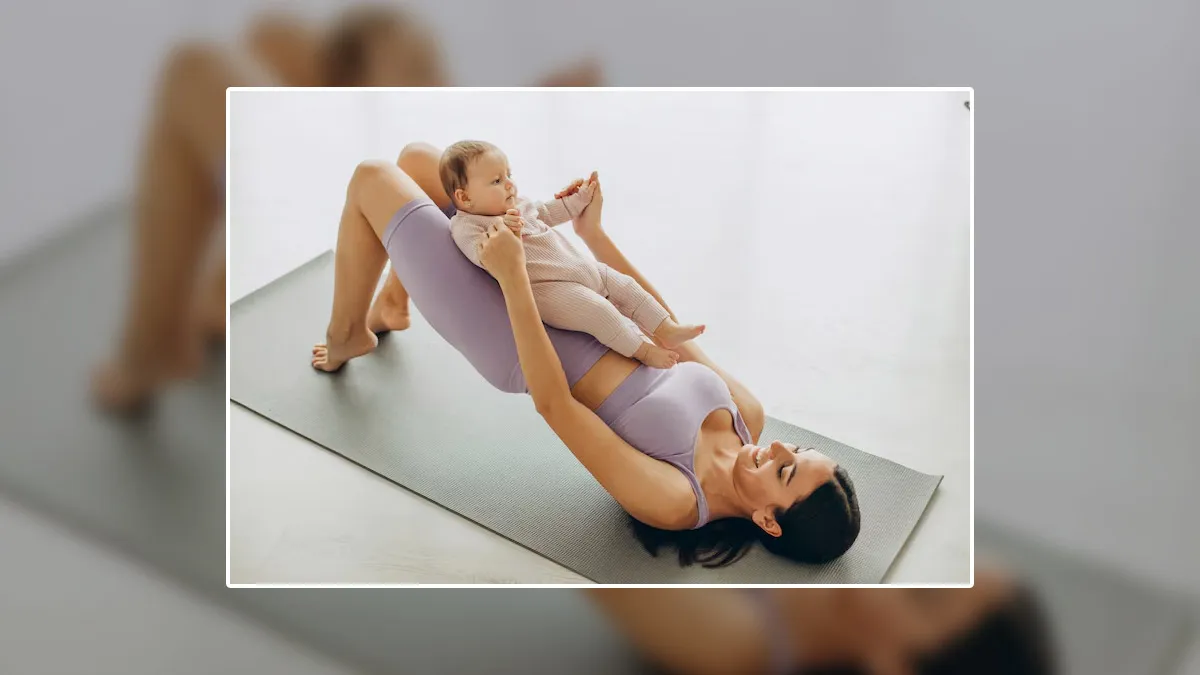
Postnatal yoga is beneficial for new mothers, aiding in the recovery process after childbirth. These routines focus on rebuilding strength, enhancing flexibility, and restoring emotional balance.
Postpartum, core strength is often compromised. Yoga asanas like pelvic tilts and gentle twists help engage and strengthen the abdominal muscles, promoting a gradual recovery of core strength.
Childbirth can strain the pelvic floor muscles. Specific yoga poses, such as Kegels and modified squats, target these muscles, aiding in their toning and overall pelvic floor rehabilitation.
Postnatal yoga emphasizes gentle stretching to enhance flexibility. Poses like forward bends and gentle backbends contribute to increased flexibility, especially in areas prone to tension after childbirth.
Caring for a newborn can be stressful. Postnatal yoga incorporates mindfulness and breathwork, providing mothers with tools to manage stress. Deep breathing exercises and meditation contribute to emotional balance.
Sleep deprivation is common for new mothers. Restorative yoga poses, such as supported child’s pose and legs-up-the-wall, offer relaxation and can help improve sleep quality, contributing to overall well-being.
Also watch this video
Postnatal yoga encourages a connection between the mind and body. Focusing on the present moment during practice helps mothers develop mindfulness, fostering a positive mindset and emotional resilience.
Every woman's postpartum journey is unique. Postnatal yoga routines are adaptable to various physical conditions, ensuring that each mother can practice at her own pace and comfort level.
Postnatal yoga follows a gradual progression. Initially, the emphasis is on gentle movements and breath awareness. As mothers regain strength, the intensity of poses can be gradually increased.
For optimal benefits, mothers are encouraged to seek professional guidance, especially if they've had complications during childbirth. Certified postnatal yoga instructors can tailor routines to individual needs.
Postnatal yoga plays a vital role in aiding women's physical and emotional recovery after childbirth. By focusing on rebuilding core strength, enhancing flexibility, and fostering emotional well-being, these routines empower new mothers on their postpartum journey.
Postnatal yoga is beneficial for new mothers, aiding in the recovery process after childbirth. These routines focus on rebuilding strength, enhancing flexibility, and restoring emotional balance.Rebuilding Core Strength:Postpartum, core strength is often compromised. Yoga asanas like pelvic tilts and gentle twists help engage and strengthen the abdominal muscles, promoting a gradual recovery of core strength.Pelvic Floor Exercises:Childbirth can strain the pelvic floor muscles. Specific yoga poses, such as Kegels and modified squats, target these muscles, aiding in their toning and overall pelvic floor rehabilitation.Flexibility Enhancement:Postnatal yoga emphasizes gentle stretching to enhance flexibility. Poses like forward bends and gentle backbends contribute to increased flexibility, especially in areas prone to tension after childbirth.Stress Reduction:Caring for a newborn can be stressful. Postnatal yoga incorporates mindfulness and breathwork, providing mothers with tools to manage stress. Deep breathing exercises and meditation contribute to emotional balance.Restorative Poses:Sleep deprivation is common for new mothers. Restorative yoga poses, such as supported child’s pose and legs-up-the-wall, offer relaxation and can help improve sleep quality, contributing to overall well-being.Mind-Body Connection:Postnatal yoga encourages a connection between the mind and body. Focusing on the present moment during practice helps mothers develop mindfulness, fostering a positive mindset and emotional resilience.
Adaptability to Physical Changes:Every woman's postpartum journey is unique. Postnatal yoga routines are adaptable to various physical conditions, ensuring that each mother can practice at her own pace and comfort level.
Gradual Progression:Postnatal yoga follows a gradual progression. Initially, the emphasis is on gentle movements and breath awareness. As mothers regain strength, the intensity of poses can be gradually increased.
Expert Guidance:For optimal benefits, mothers are encouraged to seek professional guidance, especially if they've had complications during childbirth. Certified postnatal yoga instructors can tailor routines to individual needs.
Postnatal yoga plays a vital role in aiding women's physical and emotional recovery after childbirth. By focusing on rebuilding core strength, enhancing flexibility, and fostering emotional well-being, these routines empower new mothers on their postpartum journey.
Our aim is to provide accurate, safe and expert verified information through our articles and social media handles. The remedies, advice and tips mentioned here are for general information only. Please consult your expert before trying any kind of health, beauty, life hacks or astrology related tips. For any feedback or complaint, contact us at compliant_gro@jagrannewmedia.com.